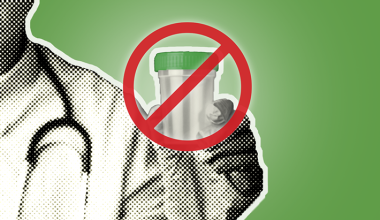
The consumption of THC-dominant cannabis products is associated with sustained reductions in anxiety and depression, according to newly published data in the Journal of Effective Disorders.
Investigators affiliated with the John Hopkins University School of Medicine in Baltimore assessed the use of state-authorized medical cannabis products in a cohort of 33 participants with clinically significant anxiety or depression. Subjects in the study were naïve to cannabis. Study participants used a variety of cannabis products, including botanical and edible preparations, as needed for six months.
“Initiation of THC-dominant medicinal cannabis was associated with acute reductions in anxiety and depression, and sustained reductions in overall symptom severity over a 6-month period,” researchers reported. Improvements in patients’ quality of life and overall health satisfaction were also observed. Medicinal cannabis use was not associated with the development of physical or psychological problems.
“Collectively these data offer insights into the therapeutic effects of medicinal cannabis when it is used by a population with clinically significant anxiety and depression,” the study’s authors concluded. “The positive response, reflected by reductions in anxiety and/or depression by most participants, support the need for continued investigation of medicinal cannabis or related cannabinoid therapeutics as pharmacological treatments for anxiety and depression symptom relief, ideally with randomized, placebo-controlled trials.”
NORML’s Deputy Director Paul Armentano said that the study’s findings are “consistent with those of prior assessments concluding that cannabis provides patients with sustained ‘statistically significant improvements’ on validated measurements of anxiety and depression.” Armentano also acknowledged that the adoption of cannabis legalization laws is associated with declines in prescriptions of anxiolytic drugs like benzodiazepines, as well as anti-depressants.
According to survey data, those who acknowledge consuming cannabis for purposes of self-medication are most likely to report doing so to alleviate pain, anxiety, sleep disturbances, and/or depression.
An abstract of the study, “Acute and chronic effects of medicinal cannabis use on anxiety and depression. In a prospective cohort of patients new to cannabis,” appears online in the Journal of Effective Disorders.
Related
Medical Disclaimer:
The information provided in these blog posts is intended for general informational and educational purposes only. It is not a substitute for professional medical advice, diagnosis, or treatment. Always seek the advice of your physician or other qualified healthcare provider with any questions you may have regarding a medical condition. The use of any information provided in these blog posts is solely at your own risk. The authors and the website do not recommend or endorse any specific products, treatments, or procedures mentioned. Reliance on any information in these blog posts is solely at your own discretion.






